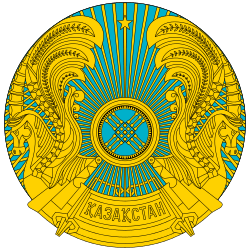Kazakhstani legislative election, 1994
 |
| This article is part of a series on the politics and government of Kazakhstan |
|
|
Politics portal |
Parliamentary elections were held in Kazakhstan on 7 March 1994. The Party of People's Unity of Kazakhstan emerged as the largest party with 33 of the 177 seats, although 64 independents were also elected. Voter turnout was 73.5%.[1]
Background
Elections were held for all the elective seats of the Parliament provided for in the constitution of January 1993. General elections for the former 360-seat Supreme Soviet had last taken place in March 1990, prior to the attainment of independence in December 1991.
The outgoing Supreme Soviet dissolved itself on 13 December 1993, five days after having set the March 1994 election date for a new, full-time professional legislature. In the meantime, certain of the Supreme Kenges’ powers were delegated to President of the Republic Nursultan Nazarbayev until the polling.
Elections
The parliamentary elections – held concurrently with those on the local level – were the first since adoption of the independence Constitution in January 1993, which also provided for a multiparty system. On this basis, the President’s own Union of People’s Unity of Kazakhstan party was challenged by several newly formed groups, especially the People’s Congress of Kazakhstan. After reduction through a screening process, 754 candidates were approved to contest the 135 popularly chosen seats. Candidates for the 42 "state list" mandates totalled 65.
The two-month campaign was marked by talk of the country's economy, President Nazarbayev committing himself to the free-market system and continued reforms particularly in the banking and tax spheres with the aim of attracting foreign investment.
Polling procedures were monitored by foreign observers, especially a parliamentary delegation of the CSCE, which called into question the free and fair nature of the vote. Final results gave a clear majority to supporters of the President and a total of approximately 60% of the parliamentary seats to ethnic Kazakhs. The Council of Ministers was headed by Prime Minister Sergei Tereshchenko.
Results
| Party | Votes | % | Seats | +/- |
|---|---|---|---|---|
| People's Union of Kazakhstan Unity | 33 | New | ||
| Federation of Trade Unions of Kazakhstan | 11 | New | ||
| People's Congress of Kazakhstan | 9 | New | ||
| Socialist Party of Kazakhstan | 8 | New | ||
| Peasants Union of Kazakhstan | 4 | New | ||
| Social Movement "Harmony" | 4 | New | ||
| Democratic Committee of Human Rights | 1 | New | ||
| Union of Kazakhstan's Youth | 1 | New | ||
| Independents | 64 | +46 | ||
| State list | 42 | New | ||
| Invalid/blank votes | 12,593 | - | - | - |
| Total | 7,030,050 | 100 | 177 | -183 |
References
- ↑ Nohlen, D, Grotz, F & Hartmann, C (2001) Elections in Asia: A data handbook, Volume I, p420 ISBN 0-19-924958-X
External links
- Inter-Parliamentary Union Report on 1994 Kazakhstani Elections
- Parliament of Republic of Kazakhstan
- Central Election Commission
| ||||||||||||||